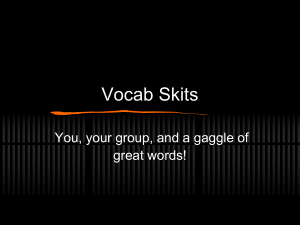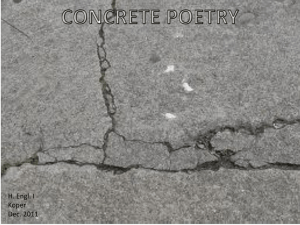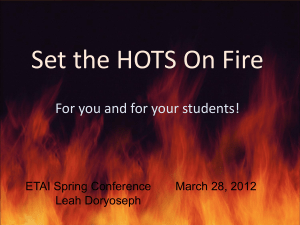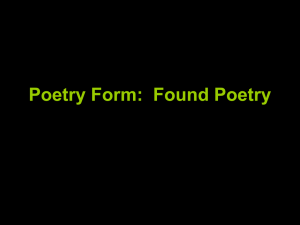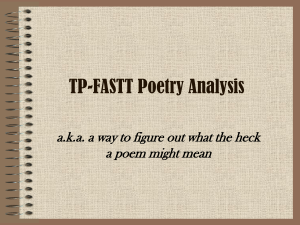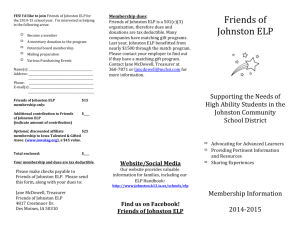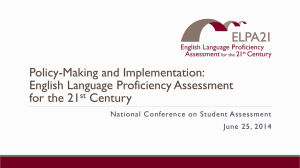View presentation - Johnston Community School District
advertisement
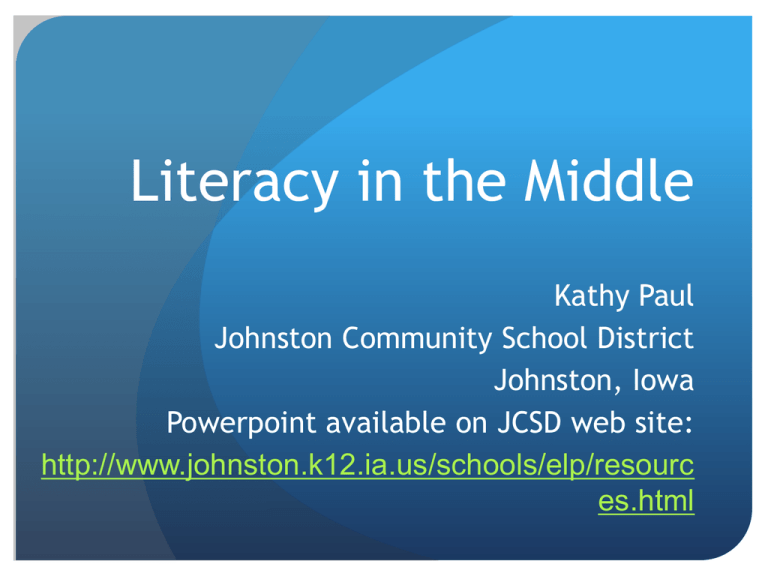
Literacy in the Middle Kathy Paul Johnston Community School District Johnston, Iowa Powerpoint available on JCSD web site: http://www.johnston.k12.ia.us/schools/elp/resourc es.html About Johnston Middle Schools: Summit, Grades 6-7 Johnston Middle (JMS), Grades 8-9 Each grade has about 500 students Not unusual to have 25% of a grade level in the 90% for standardized testing, so many students need to be served Levels of Service Personalized Education Plan (PEP) Need regular adjustments to curriculum Perform 2+ SD above peers Often 12-20 students per grade by MS Strength Area Reading (SAR) Needs are quite consistent Perform 1+ SD above peers Often 12-25 + students per grade General Enrichment (GE) Needs are inconsistent Work hard and desire enrichment Often 25+ students per grade Extended Learning Program (ELP) Services for Language Arts: Cluster groups of identified students Range: 4-8 students with strengths to Entire section of strengths • Specific scheduled classes 6-12 weeks long • Collaboration with ELP teacher for planning and implementation of differentiation Adjustments & extensions to regular curriculum Teachers who are trained to work with gifted Differentiation Provides curriculum and instruction at the appropriate level of challenge Considers: How students learn best Readiness- grade level appropriateness Interest- tapping into passion for learning What does 6th grade look like? Many teachers have cluster groups of reading (literacy) strength students—usually 4-8 students Classroom teachers ideally have training in differentiation and/or experience with gifted RTI time with gifted is part of ELP teacher’s role Pilot: 6 week classes in 3 literacy areas 6th grade class: Writing Lab This class will combine materials used from elementary ELP through Michael Clay Thompson’s vocabulary, writing/poetry with forms of writing, such as expository, persuasive, etc. Texts used will include Word Within the Word and Poetry, Plato and the Problem of Beauty, both by Michael Clay Thompson. Students will scaffold their learning about poetry while increasing their knowledge of classics-based vocabulary. As a culminating activity, students will create a personal portfolio of poetry and writing with companions from their texts. 6th grade class: Law & Order This course will provide speaking, listening, and writing skills related to law-related education. In addition to reading a previous mock trial case, students will learn about the advocacy process, including the court system and trials. Students will observe and critique others in the roles of lawyers and witnesses. They will gain an understanding of how to advocate for both sides of an issue through a trial and will develop direct and crossexam using relevant case materials. . The students will practice speaking skills by taking on the role of a witness and a lawyer. This will allow more students to have exposure to the Mock Trial experience. 6th grade class: Research & Writing Students will utilize non-fiction reading/research skills, which would allow those interested to participate in the History Day research experience. Research Class Students will choose a topic of interest related to an historical theme and will learn about primary and secondary sources. In addition to reading non-fiction materials, students will increase their understanding of relevant information, analysis, and create a related project to showcase their research. 6th Grade RTI for language arts Group size varies Chance to work with more students for screening Programming varies 6th grade RTI - Example Lost Cities Webquest For this activity you will choose your own lost city. Based on the writing styles and structure we’ve read in our Treasures text, use this document below to make your choice and examine a summary of your lost city on Wikipedia. Next, use the References at the bottom of the Wikipedia page and research found on AEA’s Search Engines (www.aea11.k12.ia.us) to learn the following 1. Why your city became lost 2. How it was found 3. What methods were used to ‘find’ it. Then, create your own diary (Word document, Power Point, Prezi, etc) showing your experience as an archaeologist discovering your lost city. Be sure to show the importance of the setting and culture of the discovered city. TED TALKS & SUPPORTING DETAILS Next week we will be viewing TED videos on a variety of topics. Because this is outside the regular curriculum, I am asking that the parent/ guardian of each student to grant permission on the topic(s) their student may review. Students will be asked to view 1 video from each group (for a total of 3 videos) and then complete a main idea / supporting details sheet for each talk. This activity will support learning of main idea and supporting details from non-fiction sources as well as 21st Century Skills in discerning quality, content, and bias from Web information sources. Group 1: Humanity and the World Kent Larson: Brilliant designs to fit more people in every city http://www.ted.com/talks/kent_larson_brilliant_designs_to_fit_more_people_in_every_city.html Anthony Atala: Growing new organs Group 2: Conservation of the Planet David Gallo on life in the deep oceans http://www.ted.com/talks/lang/en/david_gallo_on_life_in_the_deep_oceans.html http://www.ted.com/talks/lang/en/nalini_nadkani_on_conserving_the_canop Group 3: Man and Machine Vijay Kumar: Robots that fly ... and cooperate Shyam Sankar: The rise of human-computer cooperation http://www.ted.com/talks/lang/en/todd_kuiken_a_prosthetic_arm_that_feels.html Johnny Lee demos Wii Remote hacks 7th Grade Reading ELP • Classroom Cluster Groups • Collaboration with teachers • Extended Studies Programming 7th grade Menu of Programming Classes: 6-12 weeks during exploratory times Publish It! - 6 week course Students will prepare and polish a piece of writing. Various sources for publication will be explored, with the goal of creating a final piece worthy of publication. Challenge Reading: 6 week course Students will enjoy choosing and reading challenging literature as they participate in literature circles, book reviews, and response groups. Affective needs will be addressed through discussion of literature and response. Research Part I: 6 week class Students will learn how to research a topic and analyze information. Critical use of the Internet will be explored. Students will learn about topic selection, the use of primary sources, and advanced notetaking skills. They will outline and develop a research topic of their own choice or they may select a topic for the National History Day competition. Research Part II- 6 week class This course is a continuation of Research Part 1 where in students continue their research in order to produce an extended research project which will be entered into the National History Day competition. This class offers the use of college libraries, instruction in the annotation of bibliographies using 10 or more sources, and a final project such as an exhibit, multi-media project, research paper, or dramatic performance. Students taking this course are expected to compete in National History Day competitions. Mock Trial- Law Related Ed. – 12 weeks This course involves rigorous curriculum in the law, as well as speaking and writing skills. Students will learn about the law and how it applies to our society by studying a specific legal case. The class will culminate in a mock trial performance. Students are expected to work with attorneys on Tuesday evenings. Individual student participation levels will vary. Students will be witnesses, lawyers, timers, or alternates. Collaboration with classroom teachers -7th gr. Example: Poetry Literary Analysis: Using Elements of Literature Students are asked to write literary analysis essays . This type of assignment encourages you to think about how and why a poem, short story, novel, or play was written. To successfully analyze literature, you’ll need to remember that authors make specific choices for particular reasons. Your project needs to point out the author’s choices and attempt to explain their significance. Another way to look at a literary analysis is to consider a piece of literature from your own perspective. Rather than thinking about the author’s intentions, you can develop an argument based on any five combinations of terms listed below. You’ll just need to use the original text to defend and explain your argument. 7th grade collaboration From the Outside Looking In – Window Activity still left around you and be happy. - Anne Frank Think of all the beauty Task: Your group will create a window into the world of your story. This will be a great visual glimpse at the world that your character grows up in and will provide context and insight into their story. Requirements: Your window should be neat, creative and colorful. It should be unique to your group’s understanding of the story and should be clear enough that people who haven’t read the story can understand it also. Your window should have enough detail that it is clear which story it belongs to. You do not need to have people in your window; focus on the setting. Make sure your window is authentic looking; that is, has a window frame, curtains (if your character would have curtains), and other details that make it realistic and unique. Add symbolism to your window. Remember, this window is like the eyes that your character uses to look out at the world…how would they view it? Bright and sunny? Cloudy? A swirl of confusion? Make it representative of your protagonist and their feelings. Criteria Creativity: Story should be creative and unique. Small details make each window individual to its group. Neatness: The window is neat and clear, and easily understandable. The image is distinguishable and logical. Theme: The window provides a deeper insight into the world of the protagonist. It goes beyond a superficial representation of the character’s world, as well as their feelings and perceptions. Group work: Group should work cooperatively together, and it should be apparent that all group members contributed to the outcome. Written Description: The group provides a written rationale for their project that describes the theme and thought process behind their window. 8th grade cluster classes Minimum of 6 Strength Area/PEP students clustered Two teachers with PEP/SA students/average students Other staff have clusters of GE in groups of 3-8 Teachers have common plan Modifications to curriculum 8th grade modifications Extensions in text Pace Student Choice Spelling and vocabulary Content- literature/ readings Poetry- analysis and original writing 8th grade cluster class: Example of week: Monday: Vocab, Poem of the Week, *Read Chapter 8 and complete theme T-chart, Work on Poem and Vocab Tuesday: Analysis of 7-8, *Read Chapter 9, Ingredient Activity, Work on Poem and Vocab Wednesday: Chapters 10-11 *Begin Billiards Flow Chart, Work on Poem and Vocab Thursday: Analysis of Ch. 9-10 *Read Ch. 12, Finish Billiards Flow Chart Friday: Collect vocab, Poetry Contest, Analysis of Ch. 11-12, Collect Journal Entries, Media Study * = homework if not finished in class (Please don't forget to read 20 minutes a day - it'll make you smarter, should be enjoyable, and will help improve your vocabulary, and writing!) Modified Unit of Study Lesson plan DAY 1 Powerpoint Life in the 60s Handout, Intro – Middle School Society Anticipation Guide *Context for Outsiders DAY 2 Spot check Context Handout books and read Chapter 1 *Create concept map; questions for Chapter 1-2 DAY 3 Read Chapter 2 Complete questions and concept map and hand in during class *Read Chapter 3 Lit Circle discussion using questions/ideas Lit Circles Use to teach analysis and deep understanding Template created to guide students Connections, writer’s craft, passages of interest, open-ended questions Sticky notes to mark passages/quotes Modeled example for students Discussions are rich and thoughtful Press Conference Students become characters from the book. The “reporters” are ready to ask questions of each character. Each student has a chance to be a reporter, as roles switch throughout the class period. Use of online classroom program Moodle or Blackboard or similar program Students can discuss online, teacher monitors Students are selected to add writings Teacher can post assignments & syllabus Teacher can share resources with other staff Resource materials are available for students, ie how to create a bibliography Weekly Poetry Study My First Three Chest Hairs By Donald I am looking in the mirror and what do I see? growing on me! I would much prefer they grow in pairs, hairs One’s as solid as an old tree trunk, junior high punk. I remember when my chest was bare, chest hair. Getting this chest hair makes me proud of it start to covet. Now all the other guys will When I go to the swimming pool, three hairs look cool. The girls are gonna think my What! One more! I might be a monkey! Maybe I will become like a big furry bear, with no hair. I see myself covered in hair. Finally, three chest hairs But no! I have three chest The others are flimsy like a But now I can say I have That makes four! Wouldn’t that be funky! But I’d rather be fuzzy wuzzy Oh my goodness what will I wear? The Taste of Lemons by Anna The taste burns my lips, the juice making my tongue quiver like the strings on a guitar. My eyes water and tears run down my face like rain so I squeeze them shut tight. I lick the tartness away, squeeze every drop out until my mouth is alive with thetaste of the lttle yellow fruit. Student response Re: The Taste of Lemons By Nicole - Monday, 24 September 2012, 06:14 PM I love your poem! It really describes how it feels to eat a lemon. I really like the part about your tounge quivering like guitar strings. I love eating lemons, and know all those feelings well. Way to capture a moment’s feeling in a poem. Your words are powerful. Resources added to Moodle Purdue OWL (Online Writing Lab) List of commonly misspelled words Lists of classic fiction Books students have read & recommend 9th Integrated Language Arts Pilot of language clusters for last 3 years Used MAP, IA Assessments, teacher recs One teacher, 3 sections Same standards and benchmarks Modifications in pace & content Course Description Cluster Group English is a yearlong course for eligible students who choose to challenge themselves. Student learning goals, outlined in our district Standards and Benchmarks, blend five literacy strands (reading, writing, listening, speaking, and viewing). Students may look forward to authentic writing and competition opportunities as well as collaborative learning and discussion over common texts such as Romeo and Juliet, The Odyssey and various literature titles. Students will pair contemporary fiction and canonical literature to explore common themes and character analysis. Independent reading will encourage students to select books from the College Bound Reading List. Course Description continued Students will participate in civic discussions with elected officials as part of a persuasion unit. Students will extend their analysis of fiction to focus on theme and symbol through short story. Differentiation in written analysis would include exposure to a variety of schools of literary criticism. Formative assessment will be used to determine students’ current levels of mastery and to guide extension beyond the regular English Curriculum. Students will be taught critical viewing skills to analyze the different directors’ visions in several versions of Romeo and Juliet, to become critical consumers of media, and also to introduce them to documentary film. Course outline- Semester 1 Unit One: Dealing with life changing events Major Texts: 9/11 (Documentary), Jules and Gedeon Naudet, and James Hanlon Literature Circle options: Hiroshima, John Hersey Goodbye to Manzinar, Jeanne W. Houston The Pigman and Me, Paul Zindel Diary of a Young Girl, Ann Frank The Story of My Life, Helen Keller Other selected short stories, articles, and texts Unit Two: The Odyssey Major Texts: Selections from The Odyssey, Homer Selected poems and stories, historical information Unit Three: Argument and Persuasion Major Texts: Various persuasive articles, editorials, and fiction stories Websites pertaining to a policy for student research Trip to Iowa Legislature, interviews with policy makers * This unit contains the district writing assessment Semester final Pick Your Final Exam! As simple as it sounds, we all must try to be the best person we can: by making the best choices, by making the most of the talents we've been given. - Mary Lou Retton Task: You will be finding an issue that appeals to you, and developing an ad campaign to convince me (a wealthy entrepreneur) to donate large amounts of money to your cause. Step 1: Pick a cause. This should be something that you care about and have some background knowledge. The purpose of this assignment is not to practice researching, and that should not be consuming your time. Step 2: Pick an ad campaign. Would you prefer a poster/visual? A commercial? A written grant application? How will you be best able to get your message across? You can pick whichever medium you find to be most effective. The only rule is that you must use Logos, Ethos, AND Pathos effectively to persuade me. Step 3: You will write a rationale explaining your process, strengths, struggles, and creative and persuasive decisions. This must be turned in when you share your project with the class. Step 4: You will be sharing your project with the class. If your project is a formal presentation, then that is what you will do; if it is not, you will be informally sharing your process and outcomes with your peers. Written Rationale for Final On a typed sheet of paper, you need to respond formally to the following questions. To effectively answer all of these, your response will be AT LEAST one page long, double-spaced. What median did you decide to use? What reasons did you have for choosing it? What process did you use to create your product? What parts of the process were the hardest? What parts were the easiest? How did you incorporate logos, ethos, and pathos into this project? Why did you pick the organization that you did? Do you have a connection to it, or just an interest? What did you learn while doing this project? This piece should be in MLA format, with no errors in grammar, punctuation, spelling, etc. Have it ready to turn in on the day that you share with the class. Spring Semester outline Romeo and Juliet Lit Circles with written analysis Debate Non-fiction writing History Day research option History Day Research Final Exam Second Semester Finding a New Perspective Final Part A Task: This year, we have learned about perspective – finding new perspectives on life changing events, seeing things from new perspectives, and trying to get others to see things from our perspective. You now have the chance to creatively apply the idea of perspective to something that you have read over the course of the year. Here’s how it works: You will pick a novel, non-fiction work, or poem that you have read at some point this year (either for class or on your own). Then you will find a way to present that in a new form. The idea here is that you will keep the same characters, theme, message, and ideas, but present them in a new format. Sample formats that you can use: Comic book Narrative (if it’s not already) Newspaper Piece of artwork Oral Interpretation Poem Poster PowerPoint or Prezi Scrapbook Anything else (as approved) Reflection Once you have completed the creation portion of this assignment, you will construct a two-page (double spaced) reflection on your creation. This reflection is due with your project and should include the following: Summary of original work Description of your creation Symbolism and theme in original story AND Symbolism and theme in your creation Thoughts on your creative decisions during this process Show & Tell: final presentation After completing your creation and your reflection, you will informally share your project with the class. This will be a time for your peers to ask you questions about your work, as well as time for you to elaborate on your process (things you struggled with, things you were especially proud of, etc.). Customize for your district! Discuss with other teachers, administrators and parents Don’t forget student input! Look at all options Pilot programs can be a good start Begin with one grade Add modifications over time kpaul@johnston.k12.ia.us http://www.johnston.k12.ia.us/school s/elp/resources.html On Johnston web site,” ABOUT US” tab DEPARTMENTS- Academic Services- ELP




